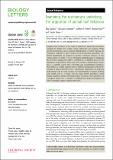Examining the mechanisms underlying the acquisition of animal tool behaviour
Abstract
Despite major advances in the study of animal tool behaviour, researchers continue to debate how exactly certain behaviours are acquired. While specific mechanisms, such as genetic predispositions or action copying, are sometimes suspected to play a major role in behavioural acquisition, controlled experiments are required to provide conclusive evidence. In this opinion piece, we refer to classic ethological methodologies to emphasize the need for studying the relative contributions of different factors to the emergence of specific tool behaviours. We describe a methodology, consisting of a carefully staged series of baseline and social-learning conditions, that enables us to tease apart the roles of different mechanisms in the development of behavioural repertoires. Experiments employing our proposed methodology will not only advance our understanding of animal learning and culture, but as a result, will also help inform hypotheses about human cognitive, cultural and technological evolution. More generally, our conceptual framework is suitable for guiding the detailed investigation of other seemingly complex animal behaviours.
Citation
Bandini , E , Motes-Rodrigo , A , Steele , M P , Rutz , C & Tennie , C 2020 , ' Examining the mechanisms underlying the acquisition of animal tool behaviour ' , Biology Letters , vol. 16 , no. 6 , 20200122 . https://doi.org/10.1098/rsbl.2020.0122
Publication
Biology Letters
Status
Peer reviewed
ISSN
1744-9561Type
Journal article
Description
Funding: The project STONECULT was funded by the European Research Council (ERC) under the European Union’s Horizon 2020 research and innovation programme (grant agreement no. 714658). E.B. and C.T. are supported by the Institutional Strategy of the University of Tübingen (Deutsche Forschungsgemeinschaft, ZUK 63). M.P.S.is supported by the University of St Andrews through a School of Biology Postgraduate Scholarship, and C.R. contributed to this piece while he was the grateful recipient of a Radcliffe Fellowship at the Radcliffe Institute for Advanced Study, Harvard University.Collections
Items in the St Andrews Research Repository are protected by copyright, with all rights reserved, unless otherwise indicated.

